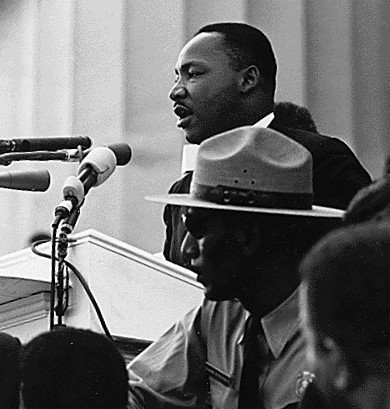As a nation we have recently celebrated the life, work and legacy of the Rev. Dr. Martin Luther King, Jr. by observing what would have been his 81st birthday on January 15, 2010. Across the nation countless observances recounted Dr. King's spirit-led speeches advocating for justice, his tireless work of non-violent resistance to institutional discrimination and oppression, and his sacrificial life offering for the hope of equality. Yet, forty-two years after the martyrdom of Dr. Martin Luther King, our country continues to struggle with administering justice universally.

America's pursuit to achieve her foundational principle that "all [men] are created equal" is evidenced by our ability to elect our first African-American President. However, the historic election also revealed the deep rooted racism that continues to plague our society, as seen in the venomous rhetoric of conservative pundits and bloggers who incite average Americans (for example, the "Tea Baggers") to engage in mono-ethnic and racially charged town halls and rallies against policy proposals that would, in many cases, directly benefit them.
It appears that the current strategy is to deny civil rights and social and economic justice to various groups within American society by isolating marginalized groups from one another in their respective pursuits of equality. This attempt to divide the oppressed into "silos" as each group seeks justice, creates competition and division among the oppressed for the same goals and objectives.
As an example, the fight for immigration reform is primarily led by Latinos, though immigration reform also affects Asian Pacific Islanders, Haitians, Eastern Europeans, Continental and Caribbean Africans and Asians. Immigration Reform affects all Americans since it could eliminate the large low-wage working class, promote livable wage jobs, increase the tax revenue base and stimulate the economy.
Similarly, education is considered by many to be the primary civil rights issue of our generation. The disparate quality of education that African-American and Latino children receive in the inner cities of America, compared to the quality of education received by Anglo and Asian children in suburban America, is reminiscent of the Jim Crow era of the segregated South. Education reform is necessary to prevent the perpetual unemployment and underemployment, poverty, crime and ultimate pipeline to the prison industrial complex of Black and Latino youth. This is not just an issue of justice for people of color, but also an economic issue for America. Three times more resources are expended to care for prisoners than are expended to educate our children.
Marriage equality in the LGBT community is a civil rights issue that has divided our country as much as any other campaign for equality. Any time one group of people are denied the rights and privileges that all other citizens are afforded, it is fundamentally and unequivocally a denial of civil rights. However, the issue of marriage equality is not an issue pertaining to just the LGBT community. Marriage equality is an issue of justice that affects the very foundational principles on which our nation was founded and still seeks to achieve. The principle of the separation of Church and State is at the root of our freedoms as Americans. The fact that marriage is a state sanctioned institution, requires us to make the institution of marriage available and applicable to every citizen.
Our challenge as a nation, is to approach the issues of justice universally, rather than in the silos of ethnic, cultural, racial, gender or religious isolation. The pursuit of the ideal that "all [men] are created equal" mandates that we equate civil rights with human rights. As Dr. King so eloquently said, "Injustice anywhere is a threat to justice everywhere." We, as a nation, must ascend to the point of affirming the dignity of all of humanity if we are truly going to achieve Dr. King's vision of the "beloved community."